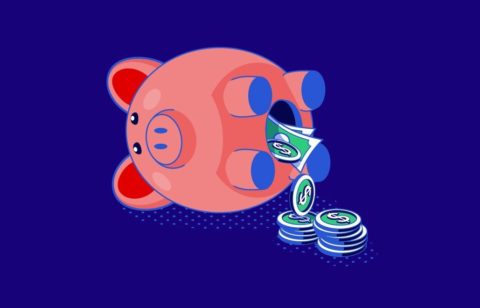
Debt in America is on the rise and has been for the last 20 years. Unfortunately, this trend shows no signs of easing up. The year 2017 ended with household debt pushing nearly $13 trillion. This is well above even the astronomical household debt seen during the Great Recession.
After many years of stagnant growth, the U.S. economy is now starting to perk up. Unfortunately, though, Americans are still feeling the effects of the very low GDP of recent years and the fact that income growth has not kept pace with the cost of living. For many Americans, this has made it difficult to make ends meet and has contributed to the accumulation of credit card debt and other forms of consumer debt.
With interest rates still relatively low and banks easing lending standards, many consumers find they have access to more credit than ever. In addition, although mortgages make up a large portion of household debt, credit cards, auto loans, and student loans have seen some very large increases in the last few years. If this describes your financial situation, you may be wondering if a debt consolidation loan is the best way to deal with your debt.
Why are Americans in so much debt?
For most consumers, their debt problem is explainable with simple math. If you have more expenses than you have income, you’ll likely accumulate a debt problem. Unfortunately, many Americans use credit cards to bridge the gap and cover everyday expenses. Moreover, since most consumers have very little savings, they’re vulnerable to life’s emergencies and have no choice but to turn to credit cards when they face an unexpected large expense such as a car repair or a broken furnace.
To make matters worse, most American consumers know nothing about budgeting or financial management in general. This makes it difficult to avoid overspending to make ends meet every month. As time goes by, many consumers find themselves accumulating more and more debt with no knowledge of how to turn things around or stop the process. When they run out of credit and/or cannot meet their monthly obligations, they find themselves teetering on the edge of bankruptcy. Many times, they’ve damaged their credit so badly that few options exist to resolve the debt problem.
If you find yourself in this situation, it’s important not to wait until your situation becomes desperate to begin working on resolving your debt problem. There are a few options at your disposal. One is to consolidate your debt with a debt consolidation loan from a bank or other lending institution.
Advantages of a debt consolidation loan
A debt consolidation loan is attractive to consumers for many reasons. Taking all your debt and rolling it into one loan with one payment can simplify paying off your debt. In addition, if you have fallen behind in your payments, a debt consolidation loan can help you catch up and begin repairing any damage to your credit. In most cases, a debt consolidation loan will carry a lower interest rate and a longer payment term, which can drastically reduce the amount of money you pay toward your debt each month.
Disadvantages to a debt consolidation loan
Some disadvantages to debt consolidation loans exist that every consumer considering one should know about. Coming to terms with how you got into debt in the first place is an important first step in getting your debt under control. If your debt problem is simply due to overspending and living above your means, you should make the necessary lifestyle changes immediately to bring your spending down to within your budget. If your obligations exceed your monthly income, look to reduce your expenses and/or increase your income.
While consolidating your debts can lower the amount of money you’re paying out each month, it’s easy for that extra cash flow to absorb into everyday spending if you haven’t changed your habits of overspending. If this happens, you could find yourself back in the same old cycle of using credit cards to cover basic living expenses. This could be a financial disaster in the making if you accumulate more debt on top of your existing, consolidated debt.
If you feel you’ve made the important changes in your lifestyle and are ready to pursue a debt consolidation loan, make sure you do all the necessary homework to explore the available options. Knowing the differences in the types of debt consolidation loans offered in the marketplace is the best first step in making the right decision for your circumstances.
The different types of debt consolidation loans
While you’ll face many confusing terms when shopping for a debt consolidation loan, there are essentially two basic types of loans: secured loans and unsecured loans. A secured loan means that the bank requires some type of asset, usually a piece of real estate, be in place as a guarantee for the loan. If you fail to pay the loan back in accordance with the terms agreed upon, you could potentially lose the property to foreclosure. An unsecured loan doesn’t require that you put up any collateral. The bank essentially lends you the money on your signature; the only thing you have at risk is your credit rating. You should understand the nuances of these types of loans before you start looking for a loan to make sure you make a good decision when consolidating your debt.
Using your home to consolidate debt
Generally, if you owe a good bit less on your home than it’s worth, and you have decent credit, you can tap the equity in your home to pay off your debt. This is possible a couple of different ways depending on your circumstances. Many consumers will refinance their existing mortgage and borrow an amount over and above the current mortgage balance. The excess cash created by the loan is usable to pay off existing debt. Depending on the state of the current mortgage market, you may be able to obtain a lower interest rate and, by recasting into a new mortgage, a longer loan term as well. This will allow you to pay off your debt balance at a lower interest rate over a longer term, which will substantially lower the amount of money you pay on debt each month.
While this may help the cash flow problem, be aware of certain aspects of a mortgage refinance. First, a home mortgage refinance will usually carry substantial closing costs. You’ll need to pay those costs upfront or roll them into the total amount financed. That amount, generally thousands, will tack on to the mortgage along with any excess money you borrow. This could mean significantly raising the amount of money you owe on your home. In addition, if you refinance into another 30-year term, the interest you pay on your refinanced debt and closing costs could become a higher amount than you would’ve paid had you reduced your debt on your own.
It’s also important to understand that the debt you owe on your credit cards is unsecured debt. This means that if you default, while your credit will take a hit, you won’t lose an asset. However, when you roll it into your mortgage, you have now moved that debt to a position secured by your home. If you’re ever in a position where you’re unable to meet your new, larger mortgage payment, you could potentially lose your biggest and most precious asset to foreclosure.
In addition, it’s important to keep in mind that you must make the necessary changes to your lifestyle to ensure that you don’t continue to accumulate credit card debt. Otherwise, a debt consolidation loan could actually make your situation worse, not better.
Considering a home equity line of credit
Some consumers will use the equity in their home in a different way. Taking out a home equity line of credit (HELOC) is a way to tap the equity in your home without refinancing your primary mortgage and incurring high closing costs. HELOCs are generally easy to obtain if you have a good amount of equity in your home and a decent credit score.
With a HELOC, the bank will approve you up to a certain amount. You don’t need to borrow all the money at once. You can draw upon the loan at any time and use the funds for whatever you wish. You can also pay back the loan at your own pace as long as you pay the interest each month on the amount you’ve borrowed. This can help consumers get back on their feet financially if they’ve fallen behind.
Again, you must consider the risks of attaching your debt to your home and be sure not to utilize the home equity loan in a frivolous way. You don’t want to accumulate more debt and make your debt situation worse.
A personal loan to pay off debt
If you’re not running behind on your payments and have maintained a good credit score, it’s possible that you could qualify for a personal loan from a bank or other lending institution. This could be a good option if your debt problem is relatively small, as these loans generally have a lending cap, meaning the bank will only lend up to a certain amount.
Personal loans generally help you pay off your debt faster and at a better interest rate so they won’t carry long loan terms as a mortgage-based loan does. Because of this, a personal loan may not substantially lower your payments each month. However, if you’re looking to solve your debt problem quickly, this might be a good option. By paying off your debt quickly, you’ll save yourself a lot of interest over the long haul.
Options for those who waited too long to address their debt problem
If you haven’t acted quickly enough to address your debt problem, you may find your options limited. However, before you consider bankruptcy, explore some of the other options available to you. Credit counseling is available to all consumers, but be sure to do your research and due diligence. Not all credit-counseling agencies are reputable, and many don’t have your best interests at heart. Research companies through the Better Business Bureau and through your state’s Consumer Protection Agency.
Another option might be to work with a debt relief company such as National Debt Relief. Companies such as these work with consumers to help them negotiate with creditors to settle their debt. The process of debt settlement is not quick or easy, but it’s an effective way to settle your debt problem and avoid bankruptcy.
Determining if a debt consolidation loan is the best way to deal with your debt requires some research and due diligence. Most importantly, you must address your debt problem while you still have many options available to you.





